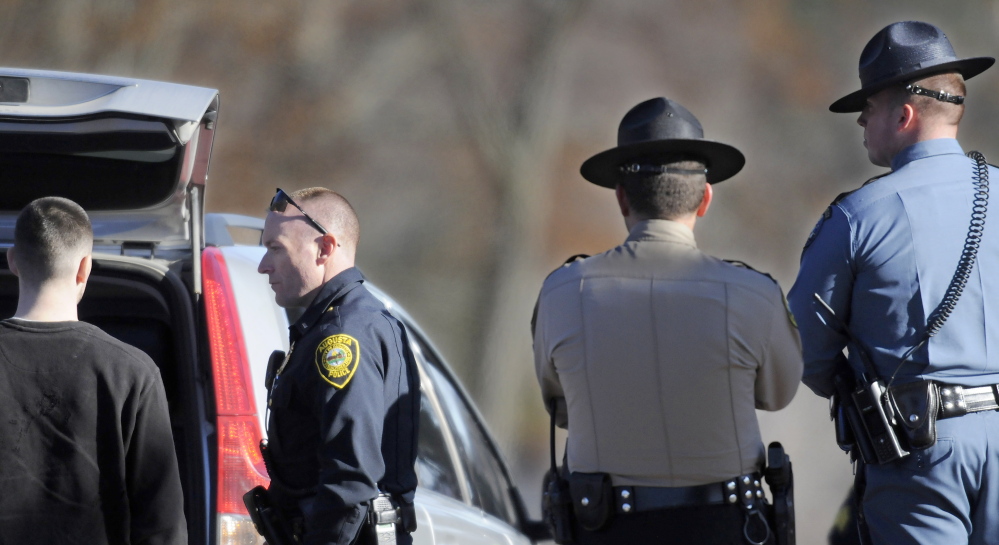AUGUSTA — Maine’s crime rate dropped last year by 9.1 percent, the largest single-year decrease in two decades, state officials said Tuesday.
Except for aggravated assaults, figures released by the Maine Department of Public Safety show an across-the-board decline in crimes from 2012.
“Maine continues to be one of the safest states in the country, and last year was the safest in Maine in two decades,” Public Safety Commissioner John Morris said in a news release. “The crime decrease is great news for the short term, and we will continue our efforts on the law enforcement side.”
The Department of Public Safety said in its news release that a total of 32,162 crimes were reported statewide last year, for an overall rate of 24.30 offenses per 1,000 people.
The decline was the biggest since 1993, the department said, when the state recorded a 9.4 percent decrease in crime.
By comparison, the department said the national average for 2012, the most recent figure available, was 30.8 crimes per 1,000 people.
Last year in Maine, violent crimes such as rape, murder and aggravated assault remained at 1 incident per 1,000 people in the state, just one-quarter the national average.
The most dramatic declines were in arsons, from 226 in 2012 to 140 last year, a drop of 38 percent; and in robberies, from 421 reported cases in 2012 to 335 reported last year, a drop of 20 percent.
Aggravated assault was the only crime that increased, from 803 in 2012 to 943 last year, a 17.4 percent increase, according to the state.
Nine fewer rapes were reported to police, a decline of 2.4 percent.
However, the Maine Coalition Against Sexual Assault noted that the decline represents only the cases that were reported to law enforcement.
“Approximately 13,000 Mainers experience sexual violence each year, but in 2013, only 359 rapes and attempted rapes were reported,” said Cara Courchesne, a spokeswoman for the coalition. “Clearly, that’s a huge gap.”
Also troubling, officials said, is the continued role of illegal drugs in the state.
Through the first five months of 2014, drug offenses have increased significantly, said Morris, who attributed it to an influx of drug dealers from out of state.
“Drugs continue to be the one issue that drives Maine’s crime,” said Morris, who said drug distributors are operating in nearly every county, selling crack cocaine, heroin and oxycodone. “Make no mistake. They are organized and ruthless. They are entrepreneurs who are here to make money no matter how.”
Gov. Paul LePage, who joined Morris at a news conference Tuesday in Augusta, said the statewide drops in crime could have been greater. He repeated his criticism of the Democratic-controlled Legislature for not passing his $3.2 million proposal to hire more drug enforcement agents, assistant district attorneys and judges to combat opioid use that has swept Maine in the last decade.
“We have good news, but quite frankly, it’s not good enough,” LePage said. “We need those judges, we need those DAs and we need those agents on the street. I’m not so concerned right now with those that are addicted.”
LePage wanted to add 14 drug enforcement agents, four assistant attorneys general assigned to drug prosecutions, and four judges to staff drug courts.
Democratic legislators in the House approved a modified version, adding $750,000 for drug treatment and scaling back the law enforcement component to 10 Maine Drug Enforcement Agency agents, two assistant attorneys general and two judges, with a reduced overall cost of $2.5 million.
Legislators called the modified bill a compromise similar to legislation passed in other states, and some critics said LePage’s proposal reflected a “war on drugs” approach that has been ineffective in reducing addiction and crime.
The governor vowed to veto any version with lower staffing levels, but he never got the opportunity, as the modified bill died in the Senate when legislators went home at the end of the session in May.
LePage urged lawmakers to return, in a statement his office released after Tuesday’s news conference.
“I could call the Legislature back to take up my bill, but Democratic leaders could simply recess immediately and go home,” LePage said. “I cannot force them to do something they are not willing to do.”
In a prepared statement issued Tuesday evening, House Speaker Mark Eves, D-North Berwick, said, “We will not reconvene the Legislature just so the governor can veto another bill. … He sat on the sidelines, resorted to his ‘my way or the highway’ approach until the last moments of the legislative session and now is playing political games to distract from his poor performance as Maine’s chief executive.”
Senate President Justin Alfond, D-Portland, said, “If he thinks we should go back in, it is certainly within his authority to call us back. … We have no intention of calling ourselves back in. We finished a very successful legislative session in May and during that time, Governor LePage was missing in action. Much like then, he refuses to cooperate with lawmakers on solving problems facing our state.”
LePage suggested Tuesday that it would “send a message” if Maine passed tougher mandatory minimum-sentencing laws for drug offenders, similar to a recent law in Louisiana that elevated the minimum penalty for selling heroin from five years in prison to 10 years, and extended the maximum for the same crime from 50 years in prison to 99 years.
LePage said, “If we’re going to fill our prisons with somebody, let’s fill it with the people who are poisoning our kids and get them off the streets. Make sure they never have an opportunity to do it again.”
On Tuesday, the governors of the other five New England states met for a “drug summit” at Brandeis University in Waltham, Massachusetts.
LePage was invited, but did not attend because of a scheduling conflict, said Adrienne Bennett, the governor’s spokeswoman.
Send questions/comments to the editors.





Comments are no longer available on this story